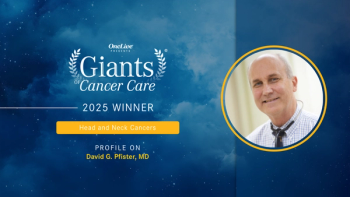
Approaching RAI-Refractory Differentiated Thyroid Cancer
Transcript:
Eric J. Sherman, MD: That’s a very interesting thing—about what we really consider to be RAI [radioactive iodine]-refractory. In most of these studies, the person has a thyroid cancer that’s seen on the scan that does not pick up any radioactive iodine on iodine scan. Secondly, maybe the person got radioactive iodine treatment and had progression within 6 to 12 months. A third scenario, which is sort of arbitrary, is based on this idea of getting more than 600 millicuries of radioactive iodine. That’s not totally unreasonable, although it is a very arbitrary number. If you already gave 600 millicuries of radioactive iodine, you may end up in a really dangerous level if you keep trying to give radioactive iodine. A few decades ago, that’s what would happen.
More and more, people are starting to use PET [positron emission tomography] scans. We’ve been doing this for a while. It’s been shown that FDG [18F-fluorodeoxyglucose] avidity seen on a PET scan is inversely related to radioactive iodine uptake. So if a patient has an elevated SUVmax [maximum standardized update value] on a PET/CT, I think you could be pretty sure that they are not going to respond to radioactive iodine. It’s not necessary to make the patient go through a radioactive iodine scan or treatment. This causes patients to have issues that affect their quality of life, and it delays actual treatment.
What the magic number is—I think that really varies. We have to be careful because people sometimes do these Thyrogen-stimulated PET/CT scans. That will give you an elevated FDG in the lesions, and those are probably not predictive. With a regular PET/CT scan, while the TSH [thyroid stimulating hormone] is suppressed, if the SUVmax is 5 or greater, they’re not likely going to respond to radioactive iodine. That’s a good time to think about other options for the patient. At least in all of our studies, as well as in other studies that we’re starting to see, that’s becoming a criteria.
External beam radiation was not always considered to be very effective for thyroid cancer. There have been some retrospective studies that say it’s a lot more effective than we thought it was. We’ve done some studies where we have added in a bit of low-dose doxorubicin to the radiation therapy and we’ve actually seen much higher control rates—about 90% at 4 years.
We know that it works fairly well when we have to give radiation to the neck area. The problem is that there are adverse effects. There are long-term adverse effects associated with radiation therapy. One concern that physicians who treat this disease have is that these patients may eventually go on tyrosine kinase inhibitors [TKIs]—drugs like lenvatinib. There is an increased risk for developing fistulas. We really have to choose who the right patient is to get radiation therapy. I don’t think all of us know who the perfect person for radiation therapy is.
If someone has disease in the neck and you’re not going to start them on a VEGF-TKI, surgery is probably reasonable. If someone has disease only in the neck area and nowhere else, and it keeps recurring at a much more frequent rate, then you’d have to stop doing surgery. Going forward, chemoradiation makes a lot of sense. You can get good long-term control rates in the neck area. We’ve had a good number of patients for whom that’s worked fairly well, but I don’t think it’s something that you can do for every single person. It’s not like other cancers, where just because you may have positive margins you’re going to go ahead and give radiation. You have to choose the individual patient based on what their situation is.
So what prompts someone to start systemic therapy is something that I think is still argued about within the thyroid community. When you look at the clinical studies that are out there, the criteria suggest that it’s appropriate for someone who has progressive disease by RECIST within 13 or 14 months. I think most of us realize that is not a great criterion. That overtreats patients for thyroid cancer.
A study at Memorial Sloan Kettering Cancer Center looked at doubling time of the tumor in the lung. When you see a doubling time of the tumor in the lung of 6 months or less, that seems to be a good time to give a patient TKI treatment. There seems to be a survival benefit. If it’s longer than 6 months, it might not be appropriate. I think we make a mistake by thinking that we’re going to use serum thyroglobulin at doubling time. I see a lot of people out in the community use serum thyroglobulin. That should not make a difference. It’s really the tumor, itself, growing.
There are certain locations for which we’re not going to look for a doubling time that great. Let’s say you’ve got something in a tracheoesophageal groove. It’s not going to take much growth in that tumor to suddenly invade the trachea, or to cause a person to have symptoms.
The same thing happens with the supernal lymph node. There, you might be a bit more concerned and may want to start systemic treatment earlier. You may have something running the periphery of the lung. The tumor may double or triple in size and a person may not have any symptoms. So I think you have to think about the different locations. That plays a role. But for us it’s a doubling time of the tumor within 6 months. That is what really pushes us to start treatment.
The other thing that does exist is that they’re symptomatic, and that’s almost automatic. If they’re symptomatic, you need to start some type of treatment. If you can just get away with radiation, that’s completely fine. For bone metastasis that’s causing pain, you may be able to just radiate it. But if they’re having symptoms and you’re not going to be able to just radiate—let’s say they have a shortness of breath because of multiple lung nodules—that automatically will push us to start treatment.
Trasncript Edited for Clarity


































